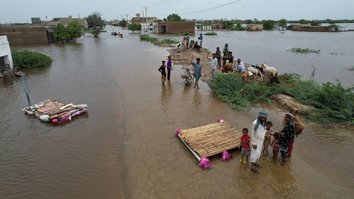ISLAMABAD -- The governments of Pakistan and China marked 10 years of economic collaboration through the China-Pakistan Economic Corridor (CPEC) last week.
However, several Chinese-built coal power plants, which have been built in Pakistan during the 10 years under the CPEC, are spewing major air pollutants in the country and exposing local populations to serious health risks, according to research studies and activists.
Coal formed a major part of Pakistan's energy projects under the CPEC, a Pakistani component of China's Belt and Road Initiative (BRI). Of the 21 completed or under-construction energy projects financed by China, nine were coal fired, according to the CPEC website.
China -- by far the world's biggest polluter and consumer of coal -- pledged at a United Nations meeting in September 2021 to end overseas coal projects as part of its contribution to the global effort to cut climate-warming greenhouse gas emissions.
![Prime Minister Shehbaz Sharif March 22 inaugurated a power plant in Thar. [Pakistani Government]](/cnmi_pf/images/2023/07/20/43072-unnamed__2_-585_329.jpg)
Prime Minister Shehbaz Sharif March 22 inaugurated a power plant in Thar. [Pakistani Government]
But on the ground, China has been ramping up coal production in a desperate attempt to meet its energy needs and to increase its influence in developing countries, including Pakistan.
Running the Chinese-built power plant on imported coal will further worsen Pakistan's economic crisis, economists and officials say.
The country in June obtained its 23rd bailout in 75 years from the International Monetary Fund (IMF).
Meanwhile, Pakistan owes China $23 billion, according to the IMF. That sum increasingly looks like an unsustainable burden.
In March, Pakistani Prime Minister Shehbaz Sharif inaugurated two Chinese-financed coal-fired power plants in Thar, an impoverished desert town in Sindh province, with a capacity of 1.65 gigawatts.
Sharif, while speaking at the inauguration of the plants March 22, dismissed criticism of the Thar coal project, calling it "a blessing with immense potential for power resources that needed to be [tapped]", state-run Associated Press of Pakistan reported.
Serious environmental concerns
Climate activists and research studies blame Pakistan's Chinese-built coal power plants, among other factors, for the climate crisis in the country.
The Climate March, an initiative by a group of activists and residents in Karachi, organised a protest on July 16 (Sunday), demanding the government phase out the Thar coal project, shut down a Chinese-operated coal power plant at Port Qasim that they say is poisonous to Karachi's residents and cancel a memorandum of understanding with Chinese state-owned PowerChina for development of a 1.3-gigawatt coal-fired power project in Sindh province.
"Instead of development and prosperity, the Thar coal project has brought forced displacement and destroyed the area's climate and traditional economy," Leela Ram, an activist from Thar, told the march's participants.
He said that the CPEC-related coal projects in Thar are not recruiting local residents and grabbed the land from poor residents forcibly and fraudulently for the plants, he said.
A group of researchers affiliated with Boston University's Global Development Policy Centre in November 2021 found that the power plant at Port Qasim has been posing "significant health risks for the surrounding community due to their proximity to the power plant, with an additional 49 deaths estimated to occur annually in the study population".
The Environmental Law Alliance Worldwide (ELAW), an Oregon-based environmental think-tank, in its April report, said that drinking water samples collected from nine locations in or near the Thar Coal-Fired Block II power plant are found "unfit for human consumption because of elevated levels of toxic metals, including selenium, arsenic, mercury, chromium, and lead".
Thar residents will suffer major health problems from coal-related projects in the region, earlier studies have predicted as well.

![Activists under the banner of Climate March protest July 17 in Karachi against coal power projects. [Zarak Khan/Pakistan Forward]](/cnmi_pf/images/2023/07/20/43071-unnamed__2_-585_329.jpg)






